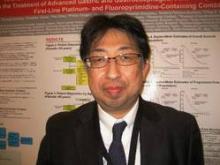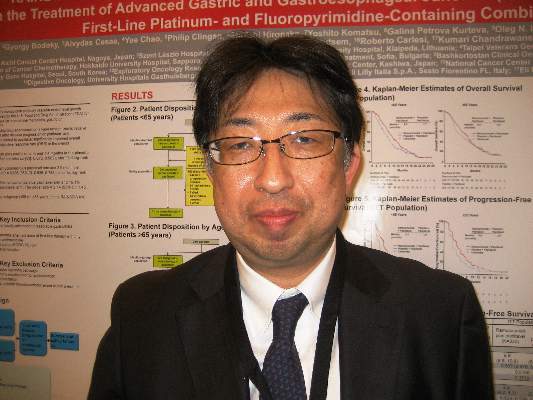User login
SAN FRANCISCO – The efficacy and safety of the antiangiogenic antibody ramucirumab in older patients with advanced esophagogastric cancers are similar to those seen in younger peers, a subgroup analysis of the phase III RAINBOW trial showed.
The trial tested ramucirumab (Cyramza) against placebo, each combined with paclitaxel, as second-line therapy among 665 patients with locally advanced or metastatic gastric and gastroesophageal junction adenocarcinoma. The antibody targets vascular endothelial growth factor receptor–2 (VEGFR-2) and is approved by the U.S. Food and Drug Administration for the treatment of esophagogastric cancers, as well as non–small cell lung cancer.
Overall, 37% of the patients studied were aged 65 years or older, according to data reported in a poster session at the at the annual Gastrointestinal Cancers Symposium sponsored by the American Society of Clinical Oncology.
The results showed that with the addition of ramucirumab versus placebo, these older patients had a 2.0-month overall survival gain that was similar to the 2.2-month survival gain seen in younger patients. The safety profile with added ramucirumab was much the same as well, except that grade 3 or higher neutropenia was more common among the older group.
“We saw very similar results” by age group, lead investigator Dr. Kei Muro, an oncologist at the Aichi Cancer Center Hospital in Nagoya, Japan, said in an interview. “Neutropenia is relatively higher in [the older group] and careful management is needed, but very similar efficacy and manageable toxicity were shown in this trial.”
The older patients in the trial, which was sponsored by manufacturer Eli Lilly, were fairly healthy other than having cancer, meeting eligibility criteria such as good performance status and adequate organ function, he said. Thus, they may not necessarily reflect patients seen in routine care.
“Ramucirumab for gastric cancer is feasible and effective in the second-line setting of advanced gastric cancer,” Dr. Muro concluded. “Ramucirumab use in all ages in the second-line setting for gastric cancer can be recommended.”
Intention-to-treat analyses showed that relative to placebo, ramucirumab prolonged median overall survival similarly among patients aged 65 years and older (10.7 vs. 8.7 months; hazard ratio, 0.86; P = .34) and among younger patients (9.3 vs. 7.1 months; HR, 0.75; P = .01).
Findings were much the same for median progression-free survival, with a benefit seen in the older age group (4.6 vs. 2.9 months; HR, 0.67; P = .0066) roughly matching that in the younger one (4.3 vs. 2.8 months; HR, 0.57; P less than .0001), reported Dr. Muro, who disclosed that he receives research funding from Eli Lilly, as well as Bristol-Myers Squibb and Merck.
Relative to placebo, ramucirumab was associated with a higher rate of grade 3 or worse neutropenia in both age groups. Among patients aged 65 years or older, the rate was 49% with the drug versus 24% with placebo; among younger patients, it was 36% and 16%, respectively.
In the ramucirumab group, the rates of most grade 3 or worse adverse events possibly related to VEGF inhibition, such as bleeding and proteinuria, were generally similar for the two age groups. Hypertension of these grades was seen in 19% of the older group, compared with 12% of the younger one.
SAN FRANCISCO – The efficacy and safety of the antiangiogenic antibody ramucirumab in older patients with advanced esophagogastric cancers are similar to those seen in younger peers, a subgroup analysis of the phase III RAINBOW trial showed.
The trial tested ramucirumab (Cyramza) against placebo, each combined with paclitaxel, as second-line therapy among 665 patients with locally advanced or metastatic gastric and gastroesophageal junction adenocarcinoma. The antibody targets vascular endothelial growth factor receptor–2 (VEGFR-2) and is approved by the U.S. Food and Drug Administration for the treatment of esophagogastric cancers, as well as non–small cell lung cancer.
Overall, 37% of the patients studied were aged 65 years or older, according to data reported in a poster session at the at the annual Gastrointestinal Cancers Symposium sponsored by the American Society of Clinical Oncology.
The results showed that with the addition of ramucirumab versus placebo, these older patients had a 2.0-month overall survival gain that was similar to the 2.2-month survival gain seen in younger patients. The safety profile with added ramucirumab was much the same as well, except that grade 3 or higher neutropenia was more common among the older group.
“We saw very similar results” by age group, lead investigator Dr. Kei Muro, an oncologist at the Aichi Cancer Center Hospital in Nagoya, Japan, said in an interview. “Neutropenia is relatively higher in [the older group] and careful management is needed, but very similar efficacy and manageable toxicity were shown in this trial.”
The older patients in the trial, which was sponsored by manufacturer Eli Lilly, were fairly healthy other than having cancer, meeting eligibility criteria such as good performance status and adequate organ function, he said. Thus, they may not necessarily reflect patients seen in routine care.
“Ramucirumab for gastric cancer is feasible and effective in the second-line setting of advanced gastric cancer,” Dr. Muro concluded. “Ramucirumab use in all ages in the second-line setting for gastric cancer can be recommended.”
Intention-to-treat analyses showed that relative to placebo, ramucirumab prolonged median overall survival similarly among patients aged 65 years and older (10.7 vs. 8.7 months; hazard ratio, 0.86; P = .34) and among younger patients (9.3 vs. 7.1 months; HR, 0.75; P = .01).
Findings were much the same for median progression-free survival, with a benefit seen in the older age group (4.6 vs. 2.9 months; HR, 0.67; P = .0066) roughly matching that in the younger one (4.3 vs. 2.8 months; HR, 0.57; P less than .0001), reported Dr. Muro, who disclosed that he receives research funding from Eli Lilly, as well as Bristol-Myers Squibb and Merck.
Relative to placebo, ramucirumab was associated with a higher rate of grade 3 or worse neutropenia in both age groups. Among patients aged 65 years or older, the rate was 49% with the drug versus 24% with placebo; among younger patients, it was 36% and 16%, respectively.
In the ramucirumab group, the rates of most grade 3 or worse adverse events possibly related to VEGF inhibition, such as bleeding and proteinuria, were generally similar for the two age groups. Hypertension of these grades was seen in 19% of the older group, compared with 12% of the younger one.
SAN FRANCISCO – The efficacy and safety of the antiangiogenic antibody ramucirumab in older patients with advanced esophagogastric cancers are similar to those seen in younger peers, a subgroup analysis of the phase III RAINBOW trial showed.
The trial tested ramucirumab (Cyramza) against placebo, each combined with paclitaxel, as second-line therapy among 665 patients with locally advanced or metastatic gastric and gastroesophageal junction adenocarcinoma. The antibody targets vascular endothelial growth factor receptor–2 (VEGFR-2) and is approved by the U.S. Food and Drug Administration for the treatment of esophagogastric cancers, as well as non–small cell lung cancer.
Overall, 37% of the patients studied were aged 65 years or older, according to data reported in a poster session at the at the annual Gastrointestinal Cancers Symposium sponsored by the American Society of Clinical Oncology.
The results showed that with the addition of ramucirumab versus placebo, these older patients had a 2.0-month overall survival gain that was similar to the 2.2-month survival gain seen in younger patients. The safety profile with added ramucirumab was much the same as well, except that grade 3 or higher neutropenia was more common among the older group.
“We saw very similar results” by age group, lead investigator Dr. Kei Muro, an oncologist at the Aichi Cancer Center Hospital in Nagoya, Japan, said in an interview. “Neutropenia is relatively higher in [the older group] and careful management is needed, but very similar efficacy and manageable toxicity were shown in this trial.”
The older patients in the trial, which was sponsored by manufacturer Eli Lilly, were fairly healthy other than having cancer, meeting eligibility criteria such as good performance status and adequate organ function, he said. Thus, they may not necessarily reflect patients seen in routine care.
“Ramucirumab for gastric cancer is feasible and effective in the second-line setting of advanced gastric cancer,” Dr. Muro concluded. “Ramucirumab use in all ages in the second-line setting for gastric cancer can be recommended.”
Intention-to-treat analyses showed that relative to placebo, ramucirumab prolonged median overall survival similarly among patients aged 65 years and older (10.7 vs. 8.7 months; hazard ratio, 0.86; P = .34) and among younger patients (9.3 vs. 7.1 months; HR, 0.75; P = .01).
Findings were much the same for median progression-free survival, with a benefit seen in the older age group (4.6 vs. 2.9 months; HR, 0.67; P = .0066) roughly matching that in the younger one (4.3 vs. 2.8 months; HR, 0.57; P less than .0001), reported Dr. Muro, who disclosed that he receives research funding from Eli Lilly, as well as Bristol-Myers Squibb and Merck.
Relative to placebo, ramucirumab was associated with a higher rate of grade 3 or worse neutropenia in both age groups. Among patients aged 65 years or older, the rate was 49% with the drug versus 24% with placebo; among younger patients, it was 36% and 16%, respectively.
In the ramucirumab group, the rates of most grade 3 or worse adverse events possibly related to VEGF inhibition, such as bleeding and proteinuria, were generally similar for the two age groups. Hypertension of these grades was seen in 19% of the older group, compared with 12% of the younger one.
AT THE GASTROINTESTINAL CANCERS SYMPOSIUM
(Cyramza)

